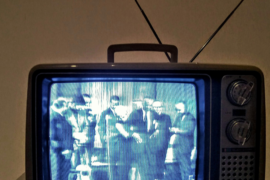Mom and I’ve trained our eyes to focus intensely for hours. Whenever I’m in my childhood home, I unroll in the recliner and Mom perches on the upright chair that’s good for her back and we watch movie after movie until bedtime. We flood ourselves in film history.
March 2023: I took the train to my parents’ house after work on a Friday. With my phone close enough to my face to be goggles, I watched Ace in the Hole (Wilder), desperate to start the movie weekend before it truly began with Mom. With Dad too. I have no misgivings about watching films on my phone, although I have little knowledge of aspect ratios, just enough to know that, if I were a real film buff, I’d care about them and talk of their importance.
Mom and Dad drove me home from the station with the check engine light on. It’s always on. Our lives are always getting distilled, more intimate. Even if there’d been a real problem with the car that weekend, Mom would’ve delayed dealing with it until I was back in New York.
“What’s on the docket this weekend?” Dad asked. I’d already discussed the roster of films with Mom but listed them for Dad, and then again because he’s hard of hearing: Cat on a Hot Tin Roof (Brooks), After Life (Kore-eda), Trouble Every Day (Denis), Out of Sight (Soderbergh), Die Hard (McTiernan), Variety (Gordon), The Big Sleep (Hawks), Two or Three Things I Know About Her (Godard), Repo Man (Cox), and Chungking Express (Wong). I am our curator. I curate without attention to tone, theme, release date, geography. I sometimes curate with length in mind. I curate based on my whims.
Saturday morning, Mom and I woke up at 8 AM. Dad had been up since 5; he’d been to the grocery store already; he got me the ingredients to make the rich smoothies I loved in high school.
I put on Two or Three Things I Know About Her. Dad watched with us for twenty minutes and then left for a walk.
I’m the one who devises our movie schedule. Typically Mom and I get through five movies a day, three before our nap and two after. It took years to build our stamina. Each day, I start us with a movie I’m excited about that will require our focus. Then another movie that will require focus but less so. And then a playful movie that will keep us awake until nap time. At 5 PM, we eat dinner and watch a movie I don’t expect to care much about but feel obligated to see. A high-energy movie finishes off the night. Of course there are times when my impressions of a film are wrong, but I try my best to assemble a measured viewing experience for myself and for Mom. “You pick such good movies for us,” she likes to tell me.
In February, I’d let Dad pick a movie: The Threepenny Opera (Pabst). Last September, Mom had picked Taste of Cherry (Kiarostami). Both were films I might’ve chosen. I hope to become a less militant curator.
As we watched Two or Three Things, I began to feel like a lousy son. I’ve watched Breathless without Mom. Contempt without Mom. Goodbye to Language and Masculine Feminine and Pierrot le Fou without Mom. I could’ve waited for her to explore the films of Jean-Luc Godard. She’s a New Wave lady. Instead I kept her away from culture.
I’d also watched In the Mood for Love and Happy Together without Mom. This is the trouble with going to college, with not coming back home after college. Your brain diverges. You watch Wong’s films without the one beside whom you should be seated.
After our nap, we put on The Big Sleep. Mom picked up on the red herrings much quicker than I did.
We watched the fifth Saturday movie on a laptop lying down in Mom’s room to give her back a rest. Dad slept on my sister’s bed. In between shots of Bruce Willis’s bare feet and his tense use of the walkie talkie, I stared up at the ceiling pocked from a peeling paint job. I thought of telling Mom that I look at her ceiling more than any other ceiling, perhaps because it’s visually interesting, but Mom seemed focused on Die Hard and I wanted to be focused on Die Hard too. I was enjoying it.
When the movie was over, I said goodnight and, “Five more tomorrow. Yay!” Mom said, “I love having you here.” We were too tired to discuss the film. There’d been little time to discuss any of the others. And I was unsure how much I had to say.
In bed, I somehow watched an episode of Archer. My eyes are ironclad.
Whenever I tell Mom, who tells Dad, that I’m coming to visit, it’s expected that we’ll watch and watch movie after movie until bedtime. But should we be talking, apple picking, writing a movie of our own instead? We talk on the phone daily when I’m in New York. We can’t pick apples because of Mom’s back. Should we be philosophizing at the library? Should we be in the escape rooms we save for when my sister’s in town? Should we be looking for a larger screen for our films?
I sometimes worry that I’ll forget how to talk to people, and to Mom, because I squeeze in all of life through my eyes.
We started the second morning of our movie marathon at 8:20 with Chungking Express. The opening scene—hectic, blurred—felt like my dream state had been extended. I too have wriggled through dense streets.
And then the movie woke me up with its slyness, its yearning, as did the sugary coffee Mom made me. In the film, each day for a month, He Qiwu hunches over cans of pineapple, searching for ones with his preferred expiration date. He prefers May 1st: his birthday; a month after his breakup. Or, I thought, he prefers to be obsessive.
There is obsessiveness in Faye’s storyline too. What a good idea to sneak into a near-stranger’s apartment and clean, redecorate, mess with food labels. I couldn’t tell if she messed with any pineapple cans. In this part of the film, there are those shots of Cop 663 scanning his apartment as if his visitor, Faye, could be hiding anywhere, everywhere, her presence coating the whole space like paint and dust. At what point does that space become more than just his but theirs?
In college, I liked to study for tests with Mom. We joked that we were getting two educations for the price of one. In a creative writing class, a professor—an admirer of horror movies and Roland Barthes—talked about texts of permission. These are texts that make you feel as if writing whatever you want to write is possible. I found that idea naive. I preferred Barthes, who argued that readers should be free to interpret a text without being constrained by the author’s intent. Perhaps this was because I always suspected myself of so badly misinterpreting texts.
I might’ve been misinterpreting Chungking Express. I paid little attention to the inclusion of “California Dreamin’.” I came up with some piddly theory about the goldfish. And while turning up the volume in accordance with a shift in scene—I’m a fiddler—I hardened my interpretation of the film as one about obsessive relationships. There are standard forms of obsession: phoning too much, jealousy of a partner’s ex… And then there’s Chungking Express.
When the film ended, Mom said, “Wow, that was beautiful.”
I considered discussing my interpretation of the film with Mom, and with Dad, who watched the last half hour and was confused, but it was almost 10 AM, so I put on the next movie.
Still, Faye’s bright, mischievous face stayed with me as we watched Repo Man. I wished she were hiding in our piano bench or behind our TV. Our house is a place where obsessiveness thrives.
That night, on the drive back to the train station, I ranked Chungking Express as my second favorite film of the weekend after Two or Three Things. Mom ranked Chungking first.
“My eyes hurt,” I said near the station. “I’ll bet,” Mom said. I said, “There’s another part to Chungking Express. Called Fallen Angels.” She said, “Good! Something to look forward to.” We didn’t say much else.
On the train back to New York, I watched bits of Chungking Express on my phone. I didn’t know why I was watching. I had more episodes of Archer to see. Perhaps just to be obsessive; I liked being obsessive. Or Chungking, I then thought, is a text of permission for me, even though I find the concept irritating. Not a text of creative permission but relational. When I watched back the film, I found affirmation of my relationship with Mom. Our relationship, at least in person, was movie after movie after movie. Watching more and more was like taking steps forward for us, our pace always the same. Yes, I drove the pace, but Mom never asked to slow down.
I began a list of the films we’d watch next: Faces (Cassavetes), Wendy and Lucy (Reichardt), Deep End (Skolimowski), Fallen Angels (Wong). Halfway through the trip, I put on Fallen Angels in search of other obsessive characters. I found plenty. They all belonged in our house. But then, before too much happened, I turned off the movie to wait for Mom.
MAX KRUGER-DULL holds an MFA in Writing from Vermont College of Fine Arts. His recent work has appeared or is forthcoming in AGNI, Litro Magazine, Roanoke Review, Quarterly West, The MacGuffin, Hunger Mountain Review, and others. He lives in New York with his boyfriend and two dogs. For more, please visit maxkrugerdull.com.
Like what you’re reading?
Get new stories, sports musings, or book reviews sent to your inbox. Drop your email below to start >>>
NEW book release
Ghosts Caught on Film by Barrett Bowlin. Order the book of which Dan Chaon says “is a thrilling first collection that marks a beginning for a major talent.”
GET THE BOOK



